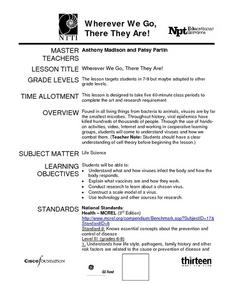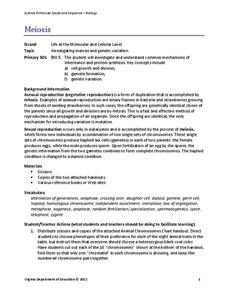Laboratory for Atmospheric and Space Physics
A Classroom Solar System
Create a scaled model of our solar system in your classroom! Scholars work collaboratively to build paper mache planets and hang them in their proper position to showcase each planet's location in the solar system.
Laboratory for Atmospheric and Space Physics
Jupiter’s Relative Size
How do you properly illustrate the extreme size difference between two planets—Earth and Jupiter? With the help of jellybeans, of course! Create a scale model of Jupiter's mass compared to Earth using a fishbowl, 1,400 beans, and a dixie...
Star Date
Solar System Scale Model Demonstration
Explore outer space and decorate your classroom with an astronomy project. Learners create a visual model with the creation of a scaled solar system using different sized balls.
Star Date
Astronomy Day from McDonald Observatory Solar System Scale Activity
Add a visual aid to your solar system lessons. Enthusiastic astronomers create a model depicting the nine planets and their distance from the sun.
Curated OER
Hydrocarbons
Making models is always memorable. In this activity, physical science starters examine the structure of hydrocarbons using marshmallows, raisins, and toothpicks. They even act as atoms themselves and link arms to represent covalent...
Curated OER
Atomic Structure and Ionic Bonding (A Visual Approach)
Using toothpicks, marshmallows, and round colored sticky dots, physical science enthusiasts build models of an atomic nucleus. In this eighth grade chemistry lesson plan, they play an atom-naming game with the models that they have...
Curated OER
Take a Stab!
Your geology class practices taking core samples of a potato to examine the stratigraphy. This is a terrific modeling lesson that helps youngsters visualize strata that cannot be seen from the surface of the ground. The directions...
Curated OER
Silica Tetrahedron Model
Very simply, pairs of learners construct a model of the tetrahedral silica structure using raisins and toothpicks. They dip it into a soapy solution and then blow a bubble "atom" into its center. The lesson plan gives instructions that...
Curated OER
Layers of Rock
Juvenile geologists drill clear plastic straws down into a playdough sedimentary rock model, pulling out sample rock cores. As they analyze their cores, they apply the law of superposition and discover that originally horizontal layers...
Curated OER
The Battle for Ultimate Power
Middle schoolers gain an understanding of how the powers of 10 and scientific notation can be used to represent the scale of things in the universe. They relate the number of stars in the universe to the number of grains of sand on...
Curated OER
Wherever We Go, There They Are!
The central video for this lesson plan is not available through the included resource link. However, the activity that simulates the passing of a virus through a population is impacting and the other resource links are invaluable. Use...
NOAA
Earth Origami
After reading a brief history of Carl Skalak's journey on the open waters, scholars make a three-dimensional model of the Earth out of an Origami balloon using a printable decorated as the Earth.
Tracy Pendry
Cardiovascular/Circulatory System
Explore the circulatory system with a cardiovascular pump activity that promotes discovery and discussion as class members create a functioning model of the heart. Continue the learning process through a web quest showcasing the body's...
Curated OER
Make a Windmill
Students explore Earth science by conducting an energy experiment in class. In this windmill lesson, students identify how wind has been used to pump water throughout history and the latest developments wind energy has produced. Students...
Curated OER
Up and Atom
"Up and Atom" is a mini-unit introducing middle-schoolers to the wonders of elements. Participants draw atom models, examine the periodic table, compare samples of metals to nonmetals, identify unknown elements, and more! The beginning...
Curated OER
Marine Habitats of Galveston Island
Four lessons introduce elementary ecologists to salt marsh and sandy beach habitats. In the first lesson, they place shells and other materials in vinegar to determine if they contain calcium carbonate. In the second lesson, they read a...
Curated OER
Edible Atom/Molecule
Upcoming chemists construct atom or molecule models out of candy. This is a classic idea that learners really enjoy; however, this lesson plan is vague. There is no instruction about the structure of atoms or molecules. Make sure you...
Curated OER
Meiosis
Using yarn and chenille stems, lab groups collaborate to model mitosis and meiosis. Brief background information and a vaguely written procedure comprise this outline. More instruction needs to be provided to learners about cell division...



















